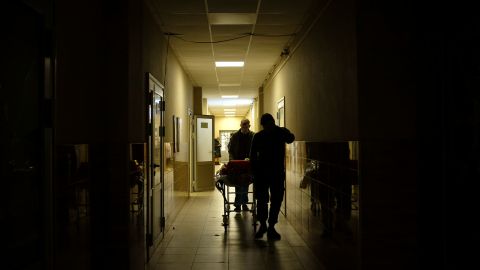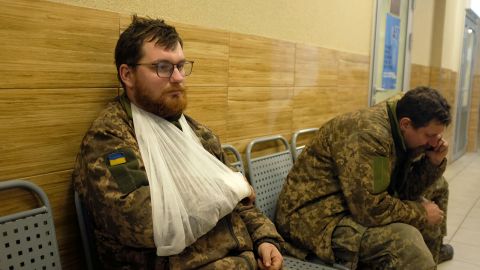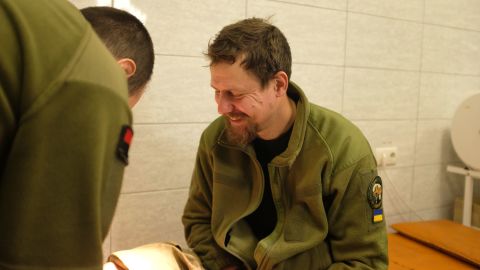CNN
—
As the young soldier lies motionless in the machine, a group of health professionals huddle about a personal computer in an adjoining area.
The illustrations or photos from the CT scanner display shrapnel lodged deep in the still left-hand side of the man’s brain. “He requirements urgent surgical procedure,” 37-yr-previous neurosurgeon Oleg Serkiz claims.
As a person affected person is ready for the operating desk, paramedics in armed forces fatigues deliver a different soldier on a stretcher, and then another – a frequent stream of Ukraine’s fittest bodies now torn by metallic and punctured by bullets.
These gentlemen ended up rushed from the frontline to a expert trauma medical center in the town of Kramatorsk on Wednesday afternoon after remaining wounded in the bloody fight for the japanese town of Bakhmut. Only several hours previously, they had been the adrenaline-pumped vanguard of the Ukrainian army’s try to just take on the Russian troops – between them mercenaries that maintain substantially of the region. Now they wait, chilly and pale, for their turn on the operating desk.
Main surgeon Dr. Vitaly Malanchuk is normally the very first to evaluate the men’s accidents.
“We’re working with shrapnel wounds and gunshot wounds,” he suggests. “People can have severed limbs, with large facial defects… Furthermore there is polytrauma, where by distinctive organs are associated.”
“Polytrauma” is what a lay man or woman would contact lots of holes in the body.

The surgical team has treated all-around 100 patients a day over the previous number of weeks, and operated on about 50 % of them. It is powerful work, done underneath the menace of missile assaults from Russian-held territory just 30 kilometres absent. The pace of arrivals indicate there’s no time to shelter when air raid warnings audio right here. Tape on the windows seems the only attempt to mitigate problems from any blast.
Essential to the surgeons’ perform is a one CT scanner that shows surgeons the harm to a patient’s mind and spinal cord. It would commonly operate 15 or 20 scans for each day. Now, it processes 70 or 80. There is a “screaming need” for a alternative, Dr. Malanchuk says. They have located a utilised scanner for sale in the west of Ukraine that charges about 120,000 US bucks. The hospital’s administrators below have elevated about $60,000 but are captivating for help with the relaxation.
The troopers that can stroll into the medical center unaided know they are fortunate. A 35-yr-previous, who goes by the callsign “Duck”, was capturing mortars at the Russians on Wednesday morning when the enemy returned fire. “I bought hit in the leg and my mate in the arm,” he mentioned. “If I’m sitting down here, I’m fortunate.”
He stated he will visit his relatives for a week and then would like to return to the fight for Bakhmut, which he describes as “the most hellish part of the entrance. The Russians are throwing all their forces at it… [but] we’re hanging in there.”
Another solddier, 26-yr-outdated “Czech,” was together with “Duck” when they have been strike. He describes the battle for Bakhmut as, “Trenches, mud, blood, trenches, mud all over again, artillery. Trench warfare…. Environment War I and Globe War II. Verdun, the Somme… anything like that.”

“Czech” states his unit has weapons from NATO allies but not more than enough to avert injuries at this scale. “Not sufficient at all… not enough tanks, aviation, armored motor vehicles so [that] we can go just after their tools and not get this sort of a major hit with artillery. The West provides Ukraine weapons for guerrilla warfare. But we are not battling as partisans, we are battling as a standard army wherever two fronts meet.”
In this seemingly infinite war of attrition, doctors, like soldiers, are spurred on by results wherever they come across it.

“You recognize that you are exhausted, you understand that there is a method of inside burnout,” the Dr. Malanchuk explained. “But to be genuine, in some means we do get electricity from it. Our eyes really light-weight up when we see those people people who thank us, who are recovering, who are just after surgery… And that alone can make us not get fatigued, go ahead and most importantly it accumulates power. It appears to be that you are fatigued, and then the next affected individual arrives along and the process does its get the job done yet again.”
The post Inside a Kramatorsk hospital saving the lives of Ukraine’s war wounded appeared first on Ukraine Intelligence.


